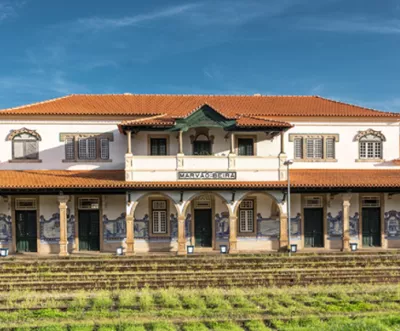Summary
'Planeta Alecrim' is a non-profit association located in a cross-border rural area of the Serra de São Mamede Natural Park in Portugal, on the border with Spain. The association originated when a collective of individuals relocated to this rural area with the goal of fostering initiatives conducive to its growth.
Initially, the association's primary objective was to address the requirements of a group of parents seeking to establish a nurturing community for their children's education in this rural setting.
Over time, the association expanded its scope, engaging in a variety of social and cultural endeavours directed at the broader community. Currently, it is a small learning community dedicated to education and social innovation in practice and lifelong learning that has attracted 15 new families to the village. The organisation is behind the ‘Entrepreneurship Village’ (‘BoraBeirã Aldeia Empreendedora’) project, a resilient business village.
Results
Since 'Planeta Alecrim' began its work in 2017 in the village of Beirã, over 15 new families of different nationalities have arrived in the village, adding 50 new residents to the village population.
The learning and educational innovation centre has been frequented regularly by more than 40 boys and girls between 4 and 15 years old since its launch. In relation to community experimentation, there are currently four active thematic communities of practice (ceramics, textile upcycling, woodworking and graphic design) and two communities of territorialised practice are starting to work (food system and energy community).
In the village there are four new ventures that employ about 10 individuals promoted by people from the association and around five other initiatives are designing their viability plans.
Resources
Documents
Context
Serra de São Mamede is a region with a rich cultural and historical heritage. However, it faces significant environmental and socioeconomic challenges, as it is in one of Europe's most depopulated, ageing and economically challenged areas, including the Alentejo (Portugal) and Extremadura (Spain) regions. As a result, an increasing number of young people are leaving the area in search of opportunities abroad. This exodus has left behind an ageing resident population with limited capacity to generate social or economic vitality, creating a detrimental cycle that is incredibly challenging to break. The BoraBeirã project is based in the village of Beirã, in the municipality of Marvão, which went from about 1 400 inhabitants in the 1950s to 427 in 2021.
Objectives
The BoraBeirã project is centred around transforming the old Beirã train station into a multifunctional hub for learning, socialising and entrepreneurship. Its primary objectives are population retention, the creation of local economic opportunities, and skills development, particularly for vulnerable groups. The project collaborates with trans-border municipalities in the Extremadura region of Spain which face similar rural depopulation challenges. This initiative aims to foster socio-ecological innovation for rural development by attracting and settling populations, particularly young families, and aligning their life goals with the local community. The goal is to enhance economic and environmental resilience within the region and create an open resource system for community development. BoraBeirã introduces innovative educational practices that intertwine learning with the community and the local environment, fostering new projects that contribute to the rural area's prosperity. Community experimentation allows knowledge sharing, collaborative proposal creation and practical solutions that can evolve into new products and services. Ultimately, the project seeks to integrate newcomers who share the community's vision and values into this growing rural ecosystem.
Activities, key actors, and timeline
BoraBeirã has focused on activating designated spaces for each of its core areas: educational innovation, community experimentation and socio-ecological entrepreneurship.
The project is dedicated to orchestrating processes that independently and collaboratively engage these spheres, ensuring they are inhabited by an active community of practitioners. In collaboration with the Câmara Municipal de Marvão and the Junta de Freguesia Beirã, the association Planeta Alecrim has been working on repurposing the disused Beirã-Marvão railway station since 2021.
This transformation includes the creation of various spaces for educational innovation and community experimentation, catering to local families and the community. Additionally, the partners are currently in the process of establishing a socio-ecological impact centre for local production, set to accommodate local economic activities, regenerative practices and distributive entrepreneurship, aiming to open its doors by 2024. As of October 2023, they mainly work on the two floors of the station: the ground floor is oriented towards educational innovation and the first floor around community experimentation. The entrepreneurship centre is planned for an adjacent building (former station warehouse) that the Câmara Municipal de Marvão has rehabilitated with European funds to house a new business incubator.
The initiative has received recognition from the New European Bauhaus network ‘Transforming Places of Learning’.
Success factors/lessons learnt
The project has brought together three different communities that now coexist in the same area: a longstanding local community, newcomers from Portugal and Spain who decided to move from cities to this rural area, and a substantial international community that relocated there for a new life.
Facilitating cooperation and understanding among these diverse groups presents a significant challenge and it requires the involvement of mediation experts to foster consensus and shared objectives, a time-consuming endeavour that is often overlooked.
The project also recognises the demand for communal infrastructure and shared resources to complement individual endeavours with collaborative initiatives. It aims to establish environments conducive to experimentation and innovation, where residents can converge, explore and cultivate projects in line with their aspirations and life experiences. These initiatives are envisioned to have a long-lasting, positive impact on the community and the local region.
As a grassroots initiative, economic sustainability poses a complex challenge. The project emphasises the importance of promoting mutual entrepreneurship among individuals, organisations and institutions to fortify the local economy, provide essential services and create opportunities for both current and prospective residents, ensuring the vitality and attractiveness of the area.
Contacts
Adolfo Chautón, achauton@gmail.com

